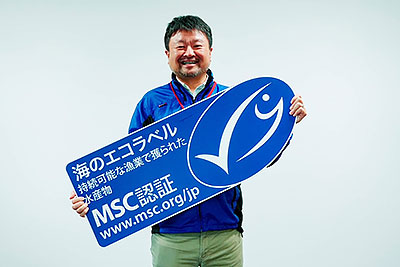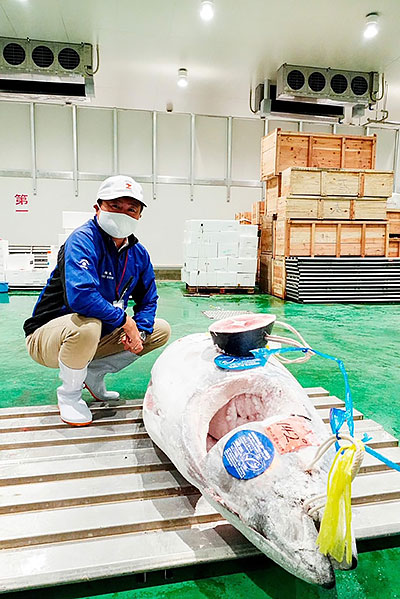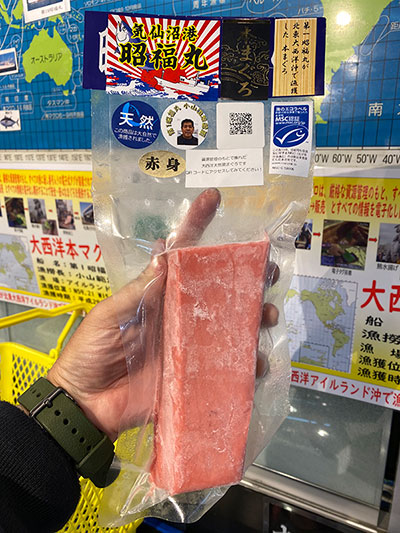Ocean Newsletter
No.492 February 5, 2021
-
Acquiring the World’s First MSC Certification for Atlantic Bluefin Tuna
USUI Sotaro
CEO, Usufuku Honten / Selected Papers No.27(p.4)
Believing that the realization of sustainable fisheries is the only way for pelagic fisheries to survive in Japan, Usufuku Honten, a company specializing in pelagic tuna fishing, has acquired certification from the Marine Stewardship Council (MSC), an international system for fishery certification. We are convinced that eliminating marine products of IUU (Illegal, Unreported, and Unregulated) origin from markets and encouraging sustainable practices among those in fisheries are necessary in order to transform Japan’s fisheries into a globally competitive industry.
Selected Papers No.27(p.4) -
Creating Habitats for Odaiba Marine Park’s Aquatic Life
HIGUCHI Tomoyuki
Manager for Environmental Protection, Port Planning and Construction Division, Bureau of Port and Harbor, Tokyo Metropolitan GovernmentOdaiba Marine Park is one of Tokyo’s leading tourist spots for enjoying the waterfront. The Tokyo Metropolitan Government Bureau of Port and Harbor replenished the park’s sand in order to generate biota and improve water quality. Immediately after the replenishment, aquatic organisms such as spionids (a relative of the lugworm) were discovered to be present and the sand to be stably layering. -
Port Quarantines during Japan’s Meiji Era –The History of Water’s Edge Border Control Strategies–
ICHIKAWA Tomoo
Associate Professor, College of Global and Regional Culture, Okinawa International UniversityFrom the late Edo period, there were frequent cholera outbreaks in Japan against the background of trade with foreign countries. In the fall of 1877 (Meiji 10), outbreaks were reaching nation-wide levels due to soldiers with cholera returning from the Satsuma Rebellion. In response to the spread, the Meiji government, unable to suppress the spread at the border, focused their efforts on establishing quarantine laws. I would like to introduce how there were also various trials and errors involved in the history of border quarantines.
Acquiring the World’s First MSC Certification for Atlantic Bluefin Tuna
Believing that the realization of sustainable fisheries is the only way for pelagic fisheries to survive in Japan, Usufuku Honten, a company specializing in pelagic tuna fishing, has acquired certification from the Marine Stewardship Council (MSC), an international system for fishery certification. We are convinced that eliminating marine products of IUU (Illegal, Unreported, and Unregulated) origin from markets and encouraging sustainable practices among those in fisheries are necessary in order to transform Japan’s fisheries into a globally competitive industry.
Motivations for Obtaining MSC Certification and the Certification Process
 Author with a MSC certification placard
Author with a MSC certification placard
Usufuku Honten Co., Ltd.’s head office is based in Kesennuma City, Miyagi Prefecture. We were founded in 1882 as a fish wholesaler. The third generation of our family then entered the fishing industry and began offshore and pelagic fishing, with our family’s fourth generation focusing solely on pelagic tuna fishing. Since I took over as the fifth-generation head in 2012, we have continued to specialize in this area. We currently have seven fishing vessels operating in Kesennuma, Indonesia, South Africa, and Spain’s Canary Islands, delivering seafood products from the world’s oceans to consumers in Japan and abroad. Our experience during the Great East Japan Earthquake in 2011 made us realize just how important food is. After the disaster, we launched the “Association for Providing Fish from Kesennuma for School Meals” to contribute to society at large and promote the use of local fish in school lunches.
However, the environment surrounding the Japanese fishing industry is becoming increasingly harsh every year due to soaring oil prices, stagnant fish prices, lack of successors, and the introduction of catch quotas based on international regulations. In Japan, inspectors from the Fisheries Agency are present when catches are landed, providing careful monitoring. However, tuna from Asian countries, which lacks catch information, is imported into Japan at low prices. This tuna is then distributed at cheaper prices than tuna caught by Japanese vessels. Adhering to international rules and maintaining marine resources are essential not only for current consumers but also for future consumers, ensuring them to enjoy fish meals and utilizing it as a source of food. We believe that sustainable fishing is the best way for Japan’s pelagic fishing industries to survive. We also believe in the importance of enabling sustainable fishing worldwide. This led us to apply for MSC certification*, an international fishery certification program. The primary assessment of our application began in August 2018.
Usufuku Honten’s catch of Atlantic bluefin tuna accounts for only about 0.2% of the world's total allowable catch. Of the 2 MSC certifications for Atlantic bluefin tuna granted so far, Usufuku Honten became the world’s first to achieve MSC certification, followed by a French fixed-net fishing operator. At the 2010 meeting of the Convention on International Trade in Endangered Species of Wild Fauna and Flora (CITES), the government of Monaco proposed a ban on the trade of Atlantic bluefin tuna. The proposal was rejected with 20 votes in favor, 68 against, and 30 abstentions. Whereas the International Commission for the Conservation of Atlantic Tunas (ICCAT) has set quotas and allocations for each country, its thorough implementation has enabled fishery resources to recover, and quotas have been gradually raised since the late 2000s. We followed ICCAT’s policy of scientifically demonstrating stock recovery for our MSC application, persevering in our efforts to become certified. The application review, which began in August 2018, culminated in arbitration proceedings. On July 30, 2020, two years after the commencement of these proceedings, an arbitrary decision was rendered. Objections were ultimately overruled, and our application was upheld. The application documents were then revised, and on August 10, it was announced that Usufuku Honten would receive the world's first MSC for Atlantic bluefin tuna.
MSC is one of the most effective ways to achieve sustainable fisheries. There needs to be a clear distinction between tuna catches. Tuna caught by sustainable fishing should be classified as white, tuna from IUU fishing as black, and tuna from questionable sources as gray. We also need to form a market (business practices) in which non-white fish are not traded, and consumers do not buy them. Obtaining MSC certification means we can make a more convincing case for the importance of resource management. We believe that revitalizing Japan’s fishing industry into one that is globally competitive will require removing IUU (illegal, unregulated, unreported) seafood from the market and nurturing fishermen who are engaged in sustainable fishing.
The Meaning of the Certification and Future Prospects
We could not have achieved MSC certification without the support of many different people. Mr. Makoto Suzuki, the representative of Nihon Gyogyo Ninsho Support (Japan Fishery Certification Support), encouraged and cooperated with us over an extended period, patiently preparing documents for certification and handling arbitration procedures. In addition, researchers at the University of Washington in the U.S. agreed that Atlantic bluefin tuna stocks have recovered to 1970s’ levels and that Usufuku Honten’s application for MSC certification, considering the small catch numbers, is a progressive step toward sustainable resource management. They published these comments on their website, which was of great encouragement to us. The support and cooperation we received from the Fisheries Agency and other related parties, and many of our colleagues, also helped us obtain this certification. Our MSC certification has been picked up by many media outlets, which has been a boost for publicity. However, the acquisition cost us about 30 million yen, which was a considerable expense. While the certification has provided us with opportunities to connect with sympathetic domestic and overseas consumers and eager hotel and restaurant personnel, as we have yet to attract the attention of major domestic retailers, we have not been able to conduct large transactions at premium prices even after attaining MSC.
Currently, we are working to obtain the Marine Eco-Label (MEL) certification, a Japanese marine product certification system. Although MEL is not as internationally recognized as MSC, we hope our participation in these programs will help support efforts to realize sustainable fisheries, including through seafood certification systems. Collection of import information under the Tuna Act (Act on Special Measures for Enhancement of the Conservation and Management of Tuna Resources) and total allowable catch (TAC) under the Act on Preservation and Control of Living Marine Resources, are already in place. In December 2020, the revised Fisheries Act was enacted, and the Act on Ensuring the Proper Domestic Distribution and Importation of Specified Aquatic Animals and Plants was also enacted in the same month. Realizing sustainable fisheries requires understanding not only from fishery operators and government, but also from consumers and distributors. I hope that these legal reforms will lead to the realization of sustainable fisheries and the revitalization of Japan's fishing industry.
Usufuku Honten will continue to engage in a variety of activities with the aim of passing on Japan’s tuna fishery to future generations and transforming the Japanese fishing industry into a growth industry once more. (End)
 Author with Atlantic bluefin tuna
Author with Atlantic bluefin tuna
 Atlantic bluefin tuna to be sold with MSC certification
Atlantic bluefin tuna to be sold with MSC certification
- *MSC certification: An international program to certify sustainable, well-managed, and environmentally friendly wild caught fisheries. “Considering “International Resource Management Certifications” from a Producer’s Point of View”, by Reiko Omoto. See: Ocean Newsletter No. 406 (July 05, 2017) for more information.
